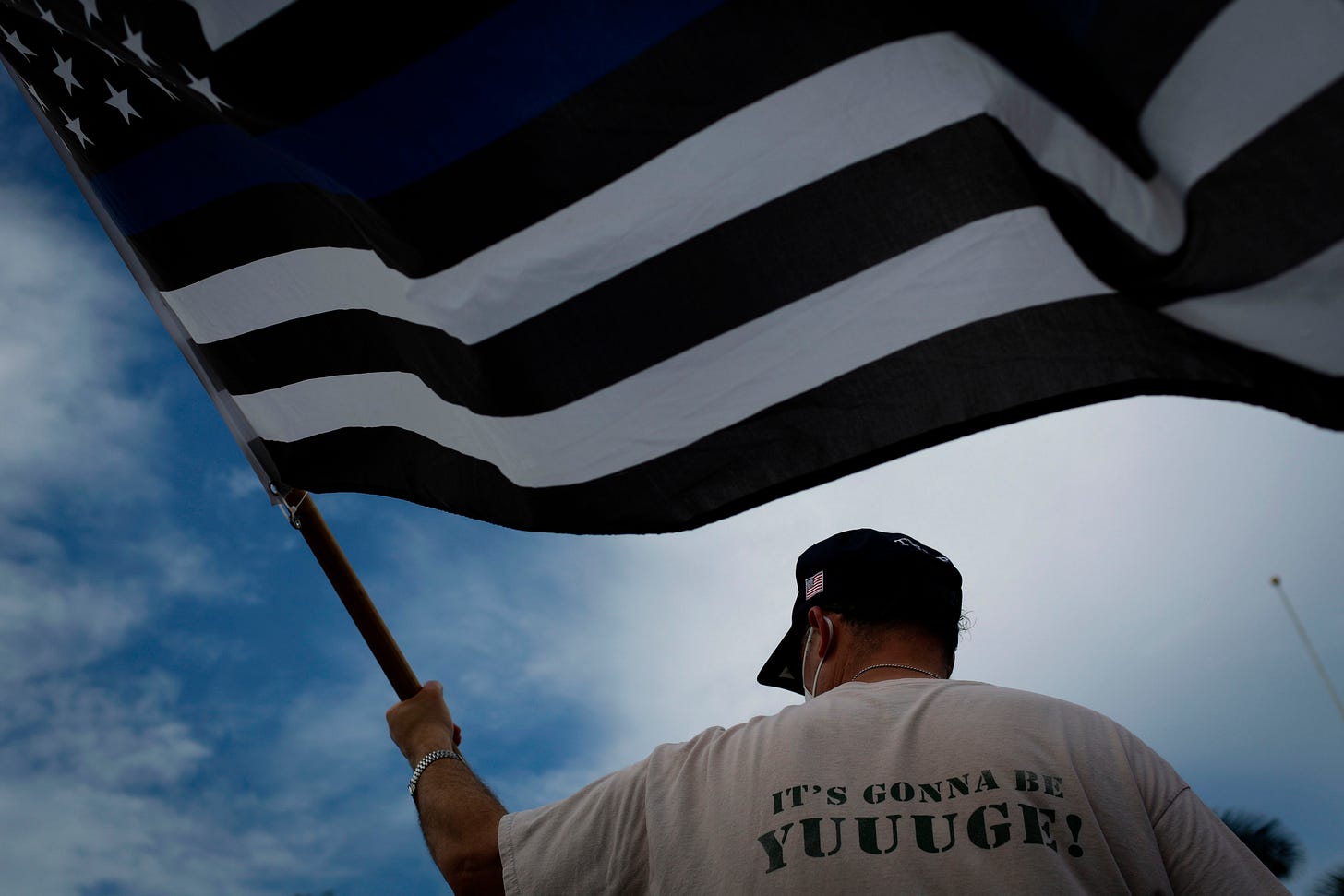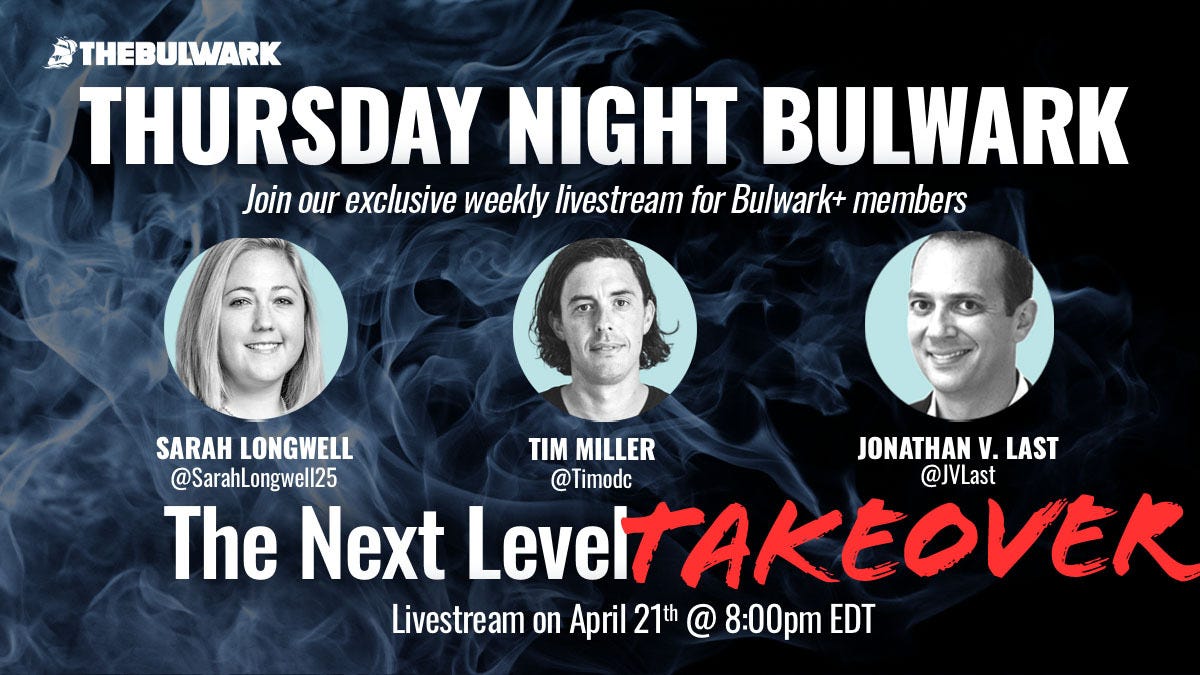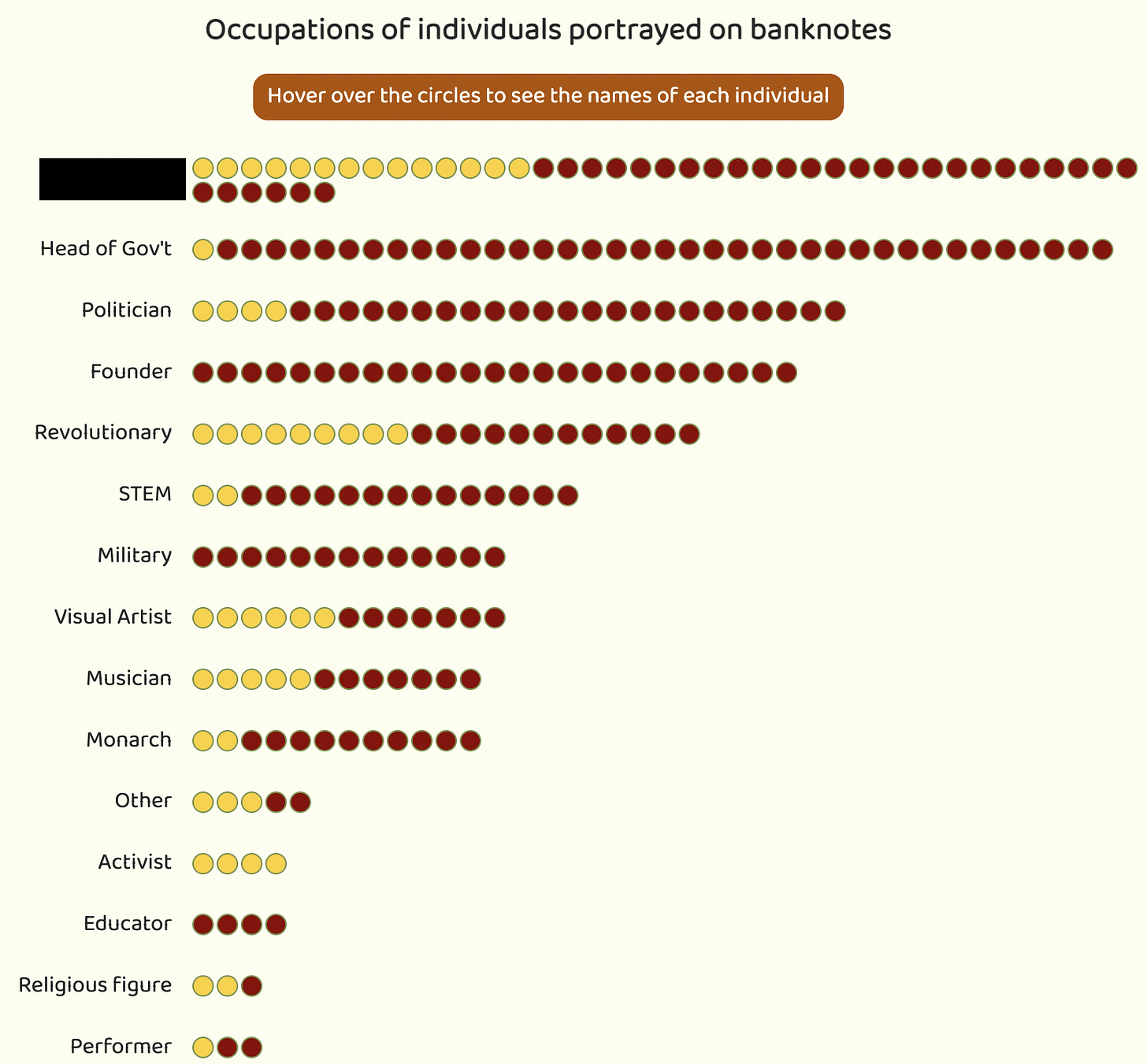The New Right Has Told Us Who They Are. Why Don't Americans Believe Them?
The people are the problem. Always.
1. They. Are. Dangerous.
When we talk about the New Right and its interest in authoritarianism, I worry that people abstract it to mean “policy views that we do not like” or “norms that we find vulgar.”
That’s not what it’s about.
In January of 2021, the New Right—at the behest of the sitting American president, Republican members of Congress, and various elected local Republicans—attempted a coup. They sought to “overturn”—President Trump’s word—the lawful results of a free and fair election.
This was not a random, spontaneous decision. In this Vanity Fair piece, J.D. Vance explains how the New Right views constitutional government:
“So there’s this guy Curtis Yarvin, who has written about some of these things,” [J.D.] Vance said. [Jack] Murphy chortled knowingly. “So one [option] is to basically accept that this entire thing is going to fall in on itself,” Vance went on. “And so the task of conservatives right now is to preserve as much as can be preserved,” waiting for the “inevitable collapse” of the current order.
He said he thought this was pessimistic. “I tend to think that we should seize the institutions of the left,” he said. “And turn them against the left. We need like a de-Baathification program, a de-woke-ification program.”
“I think Trump is going to run again in 2024,” he said. “I think that what Trump should do, if I was giving him one piece of advice: Fire every single midlevel bureaucrat, every civil servant in the administrative state, replace them with our people.”
“And when the courts stop you,” he went on, “stand before the country, and say—” he quoted Andrew Jackson, giving a challenge to the entire constitutional order—“the chief justice has made his ruling. Now let him enforce it.” . . .
“We are in a late republican period,” Vance said later, evoking the common New Right view of America as Rome awaiting its Caesar. “If we’re going to push back against it, we’re going to have to get pretty wild, and pretty far out there, and go in directions that a lot of conservatives right now are uncomfortable with.”
“Indeed,” Murphy said. “Among some of my circle, the phrase ‘extra-constitutional’ has come up quite a bit.”
This is what they want for America. They want a coup. They are not hiding it. It’s out in the open.
And yet, look at the polls. Voters are ready to push these people into power because . . . why, exactly?
Because voters don’t care about “democracy”? Because voters only care about kitchen-table issues that affect their real lives? This is what everyone keeps saying. Maybe it’s true.
I remain unconvinced. Take the real kitchen-table issue of crime. The Democratic Senate passed a measure introduced by MAGA-loving Tommy Tuberville that refused to bail out local governments who did, in fact, “defund the police.” Joe Biden wants to add $32 billion to funding police. But some people on Twitter keep tweeting that they want to “defund the police.” So “crime” is an electoral liability for Democrats.
Meanwhile, the Republican issue of the day is using the power of government to attack Disney. Disney is a giant corporation that creates thousands of jobs. And Republicans want to punish it economically. Which presumably will result in some lesser number of jobs and fewer paychecks around various kitchen tables.
And yet, somehow, “threatening Disney” is an electoral winner for Republicans, even though it is an anti-business, anti-growth position that places an abstract culture war idea above issues that affect people’s pocketbooks and real lives.
Is this Joe Biden’s fault? Is it the fault of Democratic politicians? Would the political balance of power be different today if elected Democrats pursued more moderate policies? If so, what agenda items should they have pursued and how would the political environment be different right now?
Or is the problem somewhat more intractable—some combination of the environment, the weighted system of representation, and/or . . . the people?
Discuss in the comments. You can probably guess where I come down.
I’ll just say this: What does it mean for democracy when random tweets by progressives are more of an electoral liability at the national level than the expressed, nakedly-authoritarian preferences of a Senate candidate who has been endorsed by the once (and possibly future) president of the United States?
Tonight Tim, Sarah, and JVL are doing a special Next Level Live show. It’s at 8:00 p.m.
You can find the link to the Zoom here.
Come and hang out with us! It will be very special! I may do Cletus von Ivermectin!
2. Venn Diagrams
Pursuant to our conversation about conservative hypocrisy yesterday, a question: What is the overlap between people who cheered Will Smith hitting Chris Rock and people who want Elon Musk to return unfettered “free speech” to Twitter?


I don’t think this would be a circle. But the overlap has got to be pretty significant.
3. The Face of Money
The Pudding is always great and this piece of data visualization is something I never would have guessed: What is the most common profession of people featured on currency?
When the Pudding asked this question three answers sprang to mind. And all three of them were wrong. Here’s the list, but I’ve redacted the #1 answer. Click through to see it revealed.
That’s it for today. See you tonight at 8:00 p.m for TNL Live.
Only for members of Bulwark+.







At the risk of personal exposure, I am a federal employee. All comments are my own and do not reflect the views of my agency, and I am providing this response during my personal off work time. What is my background? Prior to working for the Department of Labor (Office of Job Corps), I spent a career as an officer in the US Army, to include 8 years working for Army Accessions Command, responsible for filling the ranks with the soldiers and skill sets needed to defend our country. I have now been a federal employee for more than 7 years. Throughout my time, I’ve (almost) never discussed my personal political views, and when I have, it was subtle with a “read between the lines” response. I cannot begin to tell you the complete ignorance JD Vance has displayed in his comments. People like me aren’t sitting in some cushy office shuffling paperwork, or looking to out Lib my co-workers while secretly supporting secret pedophile groups in some basement in DC. I happen to dedicate my entire working day/week/month and year working directly with poor, unemployed, undereducated young folks (75% of them are high school drop outs) learn and earn job skills/trades so that they can be placed in dignified career paths and become productive members of society, and avoid a future of crime, prison, or dependence. And let me be clear - MOST of the young people we serve are from TRUMP zip codes in rural locations, in addition to inner city youth. Firing people and agencies like mine would be like putting a hand grenade in the conservative idea of “Give a person a fish, feed them for a day. Teach a person to fish, feed them for a lifetime”.
The stress of working as a federal employee has almost reached my limits. I’m fucking TIRED of not knowing whether I will get paid or not being able to work because of some performative asshole (looking at you Ted Cruz) flirting with government shut downs. I can earn MUCH more in the private sector, but I work where I do because my HEART is in my work. I grew up in the type of poor, white working class family that JD Vance wrote about in Hillbilly Elegy. Only I'm not writing about the problem, I'd like to believe I am DOING something about the problem. For the life of me, I can’t understand these fucking assholes (looking at you Newt Gingrich) who supposedly hate government, but spend their ENTIRE career grifting as political operatives. Vance’s comments are not just words, by the way. In the last months of Trump’s presidency, Trump's policy minions tried to change the ability to fire senior government workers for simply having different personal policy views, even though positions like mine are non-political. Look around the world - the best functioning democracies also have the best bureaucracies. People hate us, but we help make the trains run on time, and in my case, help the helpless learn to help themselves. People like me are the opposite of JD fucking Vance. While he sucks up to Trump in the most demagoguery way imaginable for his own self interest, people like me are doing the blocking and tackling in the trenches to help the lives of other Americans. But yeah, go ahead and fire me.
What struck me most about the Vanity Fair article was the degree of vacuous nihilism from these intellectuals. They didn't want liberal democracy, but they didn't really want authoritarianism, either.
The article was summed up in Vance's observation that he wanted his son to never have to work for McKinsey. In other words, he wants America to return to being the same society that begat the dysfunction his family experienced in Middletown, but somehow one that affords him the lifestyle of a venture capitalist. Vance could hang out a shingle and take up law practice tomorrow; or go to work for pretty much any firm in any city and do meaningful work, as an attorney in real estate, or employment, or product liability, or intellectual property. These are all industries that require bright legal minds at the cutting edge. But he doesn't and he won't. Nor will Hawley, or Cotton, or DeSantis, or Cruz. For each of these mean, it was federal clerkship or bust; McKinsey or bust; United States Senate (followed by a lucrative lobbying job) or bust.
It makes sense, though. In between these men's formal education and the high perches in society they now occupy, they've mostly accomplished nothing with their lives. They didn't practice law, they've never tried cases or argued appeals. They've never worked for any of the firms. All of them have extremely gilded resumes- long on accolades and short on any semblance of meaningful accomplishment.
And they want to lead the government, but offer no solutions to any of America's problems. Their convention is full of aimless people just like them, some even former Democrats. But among those, they never believed in anything concrete.
They complain about our drug problem, but support tax breaks and tort reform for the Sacklers. They complain their hometowns have been rundown and have no good jobs, but accept political contributions from the Walton family that put their Main Streets out of business. They refuse to amend the Fair Labor Standards Act, and argue that minimum wage should be abolished. They complain about crime, but offer nothing that would help track firearms, let alone impose responsibility on the most irresponsible gun owners.
They complain about the problems of public schools, but each of them sends their children to private school. They champion "vaccine freedom", but all of them are vaccinated. This is much worse than mere hypocrisy.
They decry a crisis of masculinity, and support as President, Donald Trump, the most emasculated individual to ever occupy the Oval Office, a cad's cad and coward's coward. Instead of attacking Trump for being a frequent passenger on the Lolita Express, and who publicly ogled over his oldest daughter, they've decided the Walt Disney needs to have a better message for today's children.
In 2020, they had no political platform (literally). In 2024, they won't even bother to defend themselves in a debate (not that they have a platform to defend). They're nihilists, through and through. They aren't for anything, and they have no guiding principals, no moral lodestone. At least most evil men know right from wrong and choose wrong, either willfully, or out of irresponsibility or cowardice. These men have nothing.
These are men whose lives are empty, wholly devoid of any meaning, and scared to death of the notion that their fellow Americans might find happiness in freedom. These men desire the shackles of authoritarianism, that it might inform them of what to do with their lives. Indeed, however, they'll find it just chasmic. It's why we cannot continue to allow these people such power, such influence on our society.